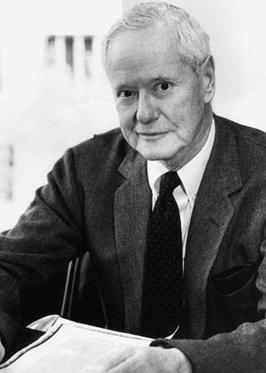
Learning theory describes how students receive, process, and retain knowledge during learning. Cognitive, emotional, and environmental influences, as well as prior experience, all play a part in how understanding, or a worldview, is acquired or changed and knowledge and skills retained.

Robert King Merton was an American sociologist who is considered a founding father of modern sociology, and a major contributor to the subfield of criminology. He served as the 47th president of the American Sociological Association. He spent most of his career teaching at Columbia University, where he attained the rank of University Professor. In 1994 he was awarded the National Medal of Science for his contributions to the field and for having founded the sociology of science.
Lifelong learning is the "ongoing, voluntary, and self-motivated" pursuit of knowledge for either personal or professional reasons. It is important for an individual's competitiveness and employability, but also enhances social inclusion, active citizenship, and personal development.

Four-dimensional space (4D) is the mathematical extension of the concept of three-dimensional space (3D). Three-dimensional space is the simplest possible abstraction of the observation that one needs only three numbers, called dimensions, to describe the sizes or locations of objects in the everyday world. For example, the volume of a rectangular box is found by measuring and multiplying its length, width, and height. This concept of ordinary space is called Euclidean space because it corresponds to Euclid's geometry, which was originally abstracted from the spatial experiences of everyday life.

Kazimierz Dąbrowski was a Polish psychologist, psychiatrist, and physician. He is best known for his theory of "positive disintegration" as a mechanism in personality development. He was also a poet who used the pen name "Paul Cienin, Paweł Cienin".
Neofunctionalism is the perspective that all integration is the result of past integration. The term may also be used to literally describe a social theory that is "post" traditional structural functionalism. Whereas theorists such as Jeffrey C. Alexander openly appropriated the term, others, such as the post-structuralist philosopher Michel Foucault, have been categorized as contemporary functionalists by their critics.
Existential psychotherapy is a form of psychotherapy based on the model of human nature and experience developed by the existential tradition of European philosophy. It focuses on concepts that are universally applicable to human existence including death, freedom, responsibility, and the meaning of life. Instead of regarding human experiences such as anxiety, alienation and depression as implying the presence of mental illness, existential psychotherapy sees these experiences as natural stages in a normal process of human development and maturation. In facilitating this process of development and maturation existential psychotherapy involves a philosophical exploration of an individual's experiences while stressing the individual's freedom and responsibility to facilitate a higher degree of meaning and well-being in his or her life.
Multimodal therapy (MMT) is an approach to psychotherapy devised by psychologist Arnold Lazarus, who originated the term behavior therapy in psychotherapy. It is based on the idea that humans are biological beings that think, feel, act, sense, imagine, and interact—and that psychological treatment should address each of these modalities. Multimodal assessment and treatment follows seven reciprocally influential dimensions of personality known by their acronym BASIC I.D.: behavior, affect, sensation, imagery, cognition, interpersonal relationships, and drugs/biology.
In US education terminology, a rubric is "a scoring guide used to evaluate the quality of students' constructed responses". Put simply, it is a set of criteria for grading assignments. Rubrics usually contain evaluative criteria, quality definitions for those criteria at particular levels of achievement, and a scoring strategy. They are often presented in table format and can be used by teachers when marking, and by students when planning their work. In UK education, the rubric is the set of instructions at the head of an examination paper.

A five-dimensional space is a space with five dimensions. In mathematics, a sequence of N numbers can represent a location in an N-dimensional space. If interpreted physically, that is one more than the usual three spatial dimensions and the fourth dimension of time used in relativistic physics. Whether or not the universe is five-dimensional is a topic of debate.
Cognitive style or thinking style is a concept used in cognitive psychology to describe the way individuals think, perceive and remember information. Cognitive style differs from cognitive ability, the latter being measured by aptitude tests or so-called intelligence tests. There is controversy over the exact meaning of the term "cognitive style" and whether it is a single or multiple dimension of human personality. However it remains a key concept in the areas of education and management. If a pupil has a cognitive style that is similar to that of his/her teacher, the chances are improved that the pupil will have a more positive learning experience. Likewise, team members with similar cognitive styles likely feel more positive about their participation with the team. While matching cognitive styles may make participants feel more comfortable when working with one another, this alone cannot guarantee the success of the outcome.

The tree of knowledge (ToK) system is a new map of Big History that traces cosmic evolution across four different planes of existence, identified as Matter, Life, Mind and Culture that are mapped respectively by the physical, biological, psychological and social domains of science. The Tree of Knowledge (ToK) System was developed by Gregg Henriques, who is a professor and core faculty member in the Combined-Integrated Doctoral Program in Clinical and School Psychology at James Madison University. The ToK System is part of a larger Unified Theory of Knowledge that Henriques describes as a consilient scientific humanistic philosophy for the 21st Century.

Elkhonon Goldberg is a neuropsychologist and cognitive neuroscientist known for his work in hemispheric specialization and the "novelty-routinization" theory.
Functional psychology or functionalism refers to a psychological school of thought that was a direct outgrowth of Darwinian thinking which focuses attention on the utility and purpose of behavior that has been modified over years of human existence. Edward L. Thorndike, best known for his experiments with trial-and-error learning, came to be known as the leader of the loosely defined movement. This movement arose in the U.S. in the late 19th century in direct contrast to Edward Titchener's structuralism, which focused on the contents of consciousness rather than the motives and ideals of human behavior. Functionalism denies the principle of introspection, which tends to investigate the inner workings of human thinking rather than understanding the biological processes of the human consciousness.
Integrative communication theory is a theory of cross-cultural adaptation proposed by Young Yun Kim. The first widely published version of Kim's theory is found in the last three chapters of a textbook authored by William Gudykunst with Young Yun Kim as second author. See acculturation and assimilation.

Neo-Piagetian theories of cognitive development criticize and build upon Jean Piaget's theory of cognitive development.
Jack Mezirow was an American sociologist and Emeritus Professor of Adult and Continuing Education at Teachers College, Columbia University.
Reinforcement sensitivity theory (RST) proposes three brain-behavioral systems that underlie individual differences in sensitivity to reward, punishment, and motivation. While not originally defined as a theory of personality, the RST has been used to study and predict anxiety, impulsivity, and extraversion. The theory evolved from Gray's biopsychological theory of personality to incorporate findings from a number of areas in psychology and neuroscience, culminating in a major revision in 2000. The revised theory distinguishes between fear and anxiety and proposes functionally related subsystems. Measures of RST have not been widely adapted to reflect the revised theory due to disagreement over related versus independent subsystems. Despite this controversy, RST informed the study of anxiety disorders in clinical settings and continues to be used today to study and predict work performance. RST, built upon Gray's behavioral inhibition system (BIS) and behavioral activation system (BAS) understanding, also may help to suggest predispositions to and predict alcohol and drug abuse. RST, a continuously evolving paradigm, is the subject of multiple areas of contemporary psychological enquiry.
Activity-specific approach in temperament research is the theory related to a structure of temperament, i.e. how temperament traits can be classified and organized. This approach suggests:
Charles Egerton Osgood was an American psychologist and professor at the University of Illinois. He was known for his research on behaviourism versus cognitivism, semantics, cross-culturalism, psycholinguistic theory, and peace studies. He is credited with helping in the early development of psycholinguistics. Charles Osgood was recognized distinguished and highly honored psychologist throughout his career.








